I know some might view my usual blogs for Amazing Stories as a little stuffy. But I can’t help that. I’ve always loved the sciences, especially astronomy and physics, and those topics that tend to cause many an eye to glaze over in morbid boredom fascinate me beyond measure.
So, this time around, I thought I’d do something a little different while slipping in a subtle reference to technology.
How so?
Aha, as well as an irresistible leaning toward all things scientific, I am – and always have been – an advocate of a darn good film, especially if said epic involves quality science fiction: “Forbidden Planet, The Day the Earth Stood Still, War of the Worlds, The Time Machine, The Fly, Planet of the Apes. 2001: a Space Odyssey, Twenty Thousand Leagues Under the Sea and Blade Runner,” immediately spring to mind.
I’m sure many of you are drawn to the memories invoked by those chosen examples too.
However, that might not be case with those classics that have suffered a modern-day curse: the Big Budget Hollywood Remake.
What do I mean?
Born as I was in 1960, I grew up watching the originals of those gems listed above – or a rerun of them, anyway – and can remember the power of the impact they made when I first saw them:
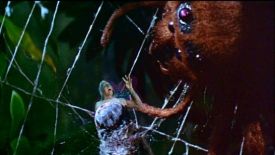
– The horror as the spider crawls toward what’s left of André Delambre (David Hedison) in The Fly, his body warped by arcane transporter experiments and his weedy little voice squeaking, “Help me, help me.”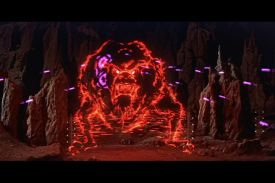
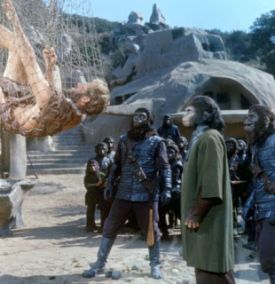
Ah, the good old days. You see, those older connoisseurs among us grew up taking for granted what many of today’s audiences don’t have. And I’m not talking about the multi-billion dollar budget and alternate-reality special effects, oh no. I’m talking about something we all need – and especially a film – if it’s going to truly live: A superb storyline with sufficient atmosphere!
I have seen the most recent versions of those motion pictures above where the latest “hot” director has woven his magic on an already established hit, and while I’ve been entertained – and in some cases I admit, thoroughly enjoyed what I watched – I’ve got to say in all honesty, they’re not a patch on the mood created by the originals.
Take for example, just one of those classics: The Day the Earth Stood Still.
For those who might not know the original story arc, here it is:
 In July 1951, a flying saucer lands in Washington. After having been surrounded by a trigger-happy military, an alien traveler, Klaatu, played by Michael Rennie, emerges from the craft, announcing that he has come in peace. As he speaks to the people gathered there, he unexpectedly opens a small device and is shot by a nervous soldier.
In July 1951, a flying saucer lands in Washington. After having been surrounded by a trigger-happy military, an alien traveler, Klaatu, played by Michael Rennie, emerges from the craft, announcing that he has come in peace. As he speaks to the people gathered there, he unexpectedly opens a small device and is shot by a nervous soldier.
A tall robot then emerges from the saucer and quickly disintegrates the soldiers’ weapons. Klaatu orders the robot, Gort, to stop, explaining that the now-broken device was a gift for the President which would have enabled him “to study life on the other planets.”
Klaatu, is taken to Walter Reed Hospital, and after surgery, uses a salve to quickly heal his wound. Meanwhile, the Army has been up to mischief. However, because Gort stands unmoving outside the spaceship, they can’t get inside.
And just as well, for Klaatu tells the President’s secretary, Mr. Harley, he has a message that must be delivered to all the world’s leaders simultaneously. Harley tells him that such a meeting in the current political climate is impossible. As such, Klaatu suggests that he be allowed to go among humans to better understand their “unreasoning and suspicions attitudes”.
Needless to say, Harley rejects the proposal, and Klaatu remains under guard.
 As with all good action films, our hero escapes, and, posing as a Mr. Carpenter, takes lodgings at a boarding house where he listens to the customers speculating as to why the “alien” has come to Earth.
As with all good action films, our hero escapes, and, posing as a Mr. Carpenter, takes lodgings at a boarding house where he listens to the customers speculating as to why the “alien” has come to Earth.
Among the residents are young widow Helen Benson and her son Bobby. While Helen and her boyfriend Tom Stevens go out, Klaatu babysits Bobby. The boy takes Klaatu on a tour of the city, including a visit to his father’s grave in Arlington National Cemetery, where Klaatu learns that most of those buried there were killed in wars.
 When Klaatu asks Bobby who the greatest living person is, Bobby suggests Professor Barnhardt.
When Klaatu asks Bobby who the greatest living person is, Bobby suggests Professor Barnhardt.
Bobby takes Klaatu to Barnhardt’s home, but the professor is absent, so Klaatu adds an equation to a problem on Barnhardt’s blackboard and leaves his contact information with the suspicious housekeeper.
That evening a government agent takes Klaatu to Barnhardt and Klaatu explains that people living on other planets are concerned now that humanity has developed rockets and a rudimentary form of atomic power. Klaatu declares that if his message is ignored, “Earth will be eliminated.”
 Barnhardt agrees to gather associates from around the world at the saucer and suggests it might be a good idea if Klaatu give a harmless demonstration of his power.
Barnhardt agrees to gather associates from around the world at the saucer and suggests it might be a good idea if Klaatu give a harmless demonstration of his power.
Klaatu returns to his spaceship that night, unaware that Bobby has followed him.
Bobby tells Helen and Tom what he saw, but they do not believe him until Tom takes a diamond he found in Klaatu’s room to a jeweler and learns it is “unlike any other on Earth.” Klaatu finds Helen at her workplace, and they take an empty service elevator, which stops precisely at noon. Klaatu reveals his true identity, then asks for her help. He has neutralized all electricity everywhere for 30 minutes, except for such things as hospitals and aircraft in flight.
 After Tom informs the authorities of his suspicions, Helen breaks up with him. She and Klaatu go to Barnhardt’s home. En route he tells her that should anything happen to him, she must go to Gort and say, “Klaatu barada nikto.”
After Tom informs the authorities of his suspicions, Helen breaks up with him. She and Klaatu go to Barnhardt’s home. En route he tells her that should anything happen to him, she must go to Gort and say, “Klaatu barada nikto.”
Their taxi is spotted and hemmed in. When Klaatu makes a break for it, he is shot dead. Helen quickly heads to the saucer. Gort kills two soldiers standing watch and advances on her. When Helen utters Klaatu’s words, the robot carries her into the spaceship, and then leaves to retrieve Klaatu’s body.
Having done so, Gort brings Klaatu back to life, but Klaatu explains to Helen that his revival is only temporary.
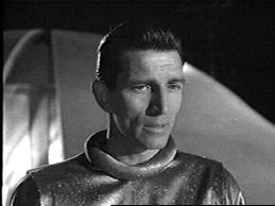 Klaatu addresses Barnhardt’s assembled scientists, informing them that he represents an interplanetary organization that created a police force of invincible robots like Gort. “In matters of aggression, we have given them absolute power over us.” Klaatu concludes, “Your choice is simple: join us and live in peace, or pursue your present course and face obliteration.”
Klaatu addresses Barnhardt’s assembled scientists, informing them that he represents an interplanetary organization that created a police force of invincible robots like Gort. “In matters of aggression, we have given them absolute power over us.” Klaatu concludes, “Your choice is simple: join us and live in peace, or pursue your present course and face obliteration.”
Klaatu and Gort re-enter the spaceship and depart.
The end
*******
For me, this is a wonderful – metaphor laden film – that surpassed the limitations of the era in which it was made to deliver a stunning message to its viewers about what’s truly important. A message that, although different in focus, is just as striking today.
(You only have to look at the news headlines to see why…Same old mistakes, much wider impact.)
For me, both the original and remake hit the mark by highlighting mankind’s blinkered attitudes when it comes to race and nationalism, as well as our over-dependent focus on energy and increasingly sophisticated technology.
The moment energy is cut off, all our hi-tech gadgets stop – and therefore – most forms of human activity. (Could you imagine kids nowadays without something electronic to press to their ears or play with?)
Adults can’t escape the consequences either. Our homes, our cars, places of work and employment. All such things are reliant on technology.
And the simple fact is, because we’re still a divided, insular “worldwide” community, the way we develop our latest breakthroughs mean that the very things we’ve become dependent on are now more than capable of killing us.
A timely lesson.
Don’t get me wrong, I did enjoy the remake and I’m a great fan of Keanu Reeves. But the emphasis had changed in the version he appeared in to one of mankind’s definite destruction in order to salvage a planet ravaged by environmental damage. Klaatu was no longer a messenger or savior; he was there to unleash Armageddon in a stunningly visual display that glued your eyes to the set.
Visual orgies aside, I missed the thought-provoking suspense and drama of the original. (Something I’ve only seen captured recently, in my humble opinion, by Arrivals
So what does this mean?
Well, that’s why I tried to use a technologically-based figure of speech: If it ain’t broke, don’t try and fix it.
Many of the above films are absolute gems, and trying to re-cut them will only spoil their individuality and luster. And as viewers are beginning to appreciate, just because it’s new doesn’t guarantee it’ll be better. More often than not, we’re left with a sour taste in our mouths and a hankering for the “good old days.”
What about you?
Andrew P. Weston is a Royal Marine and Police veteran from the UK who now lives on the beautiful Greek island of Kos with his wife, Annette, and their growing family of rescue cats.
As creator of the critically acclaimed IX Series, the Cambion Journals, along with Hell Bound, Hell Hounds, and Hell Gate, (novels forming part of the Heroes in Hell universe), Andrew has the privilege of being a member of the Science Fiction and Fantasy Writers Association, the British Science Fiction Association, the British Fantasy Society, and the International Association of Media Tie-in Writers.
When relaxing, Andrew devotes some of his spare time to supporting animal charities, as well as writing review articles for Amazing Stories and The Magazine of Fantasy & Science Fiction.





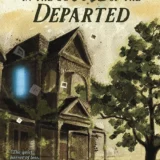

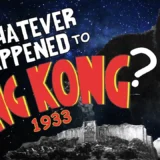

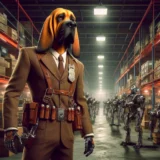
I like the chain-smoking doctors trying to puzzle out why Klaatu looks so young and healthy.
I think that was explained in Allen’s Sleeper…it’s good for you!
Ah, the heady days of black and white tv… 🙂